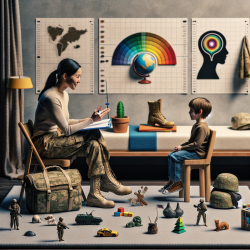Introduction
As speech-language pathologists, our work often intersects with various aspects of child development and mental health. Understanding the diverse impacts of deployment-related encounters with children among military veterans can enhance our therapeutic approaches. A recent qualitative study by Houle et al. (2024) sheds light on this topic, revealing critical insights into the nature and consequences of such encounters.
Key Findings from the Study
The study identifies six primary themes related to deployment-related encounters with children:
- Types of Encounters: Veterans encountered children in diverse roles, from being part of the local population to being involved in armed violence.
- Contextual Factors: The mission framework, deployment environment, and personal context significantly influenced the encounters.
- Appraisals of Encounters: Veterans' socio-cultural and strategic appraisals shaped their experiences and reactions.
- Impacts of Encounters: Encounters led to psychological, existential, social, and professional impacts, affecting veterans' mental health and identity.
- Coping Strategies: Veterans employed various coping strategies, both during and after deployment, to manage the impacts of these encounters.
- Support Experiences: Veterans described their experiences with formal and informal support systems post-deployment.
Implications for Practitioners
For practitioners working with children and families, understanding these themes can guide interventions and support strategies. Here are some actionable insights:
- Recognize the Complexity: Deployment-related encounters with children are complex and multifaceted. Practitioners should consider the diverse roles children may play in conflict zones and the profound impacts these encounters can have on veterans.
- Enhance Training: The study highlights a lack of preparedness among veterans for encounters with children. Incorporating training on these issues into pre-deployment and therapeutic programs can improve outcomes.
- Focus on Coping Strategies: Encouraging adaptive coping strategies, such as connecting with peers and seeking professional support, can mitigate the negative impacts of these encounters.
- Provide Comprehensive Support: Developing robust support systems, both formal and informal, is crucial for veterans dealing with the aftermath of deployment-related encounters with children.
Encouraging Further Research
While the study provides valuable insights, further research is needed to explore the gender differences in these encounters and their impacts. Additionally, examining the long-term effects on veterans' families and children can enhance our understanding and inform therapeutic practices.
To read the original research paper, please follow this link: The nature and impacts of deployment-related encounters with children among Canadian military Veterans: a qualitative analysis.










